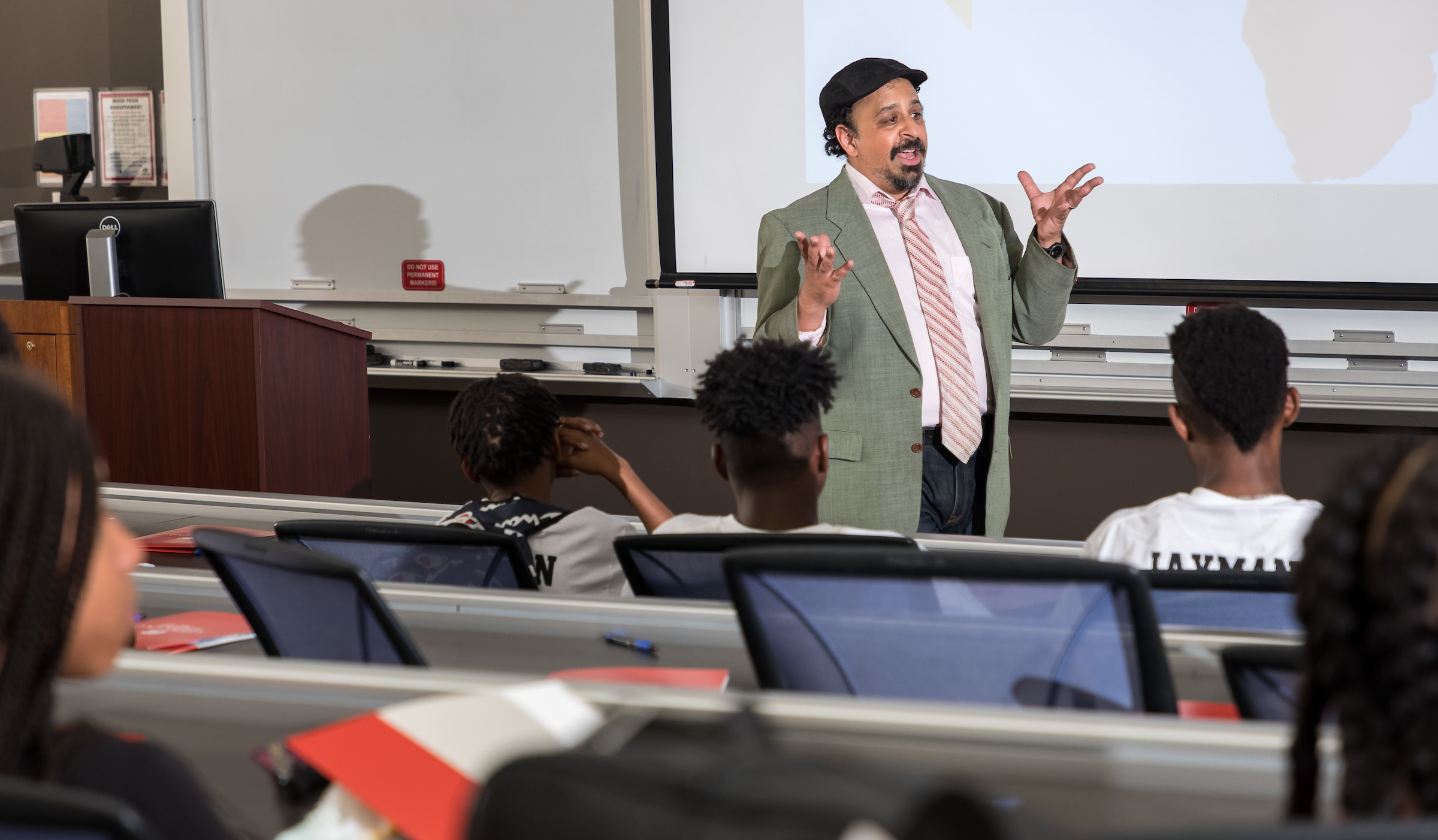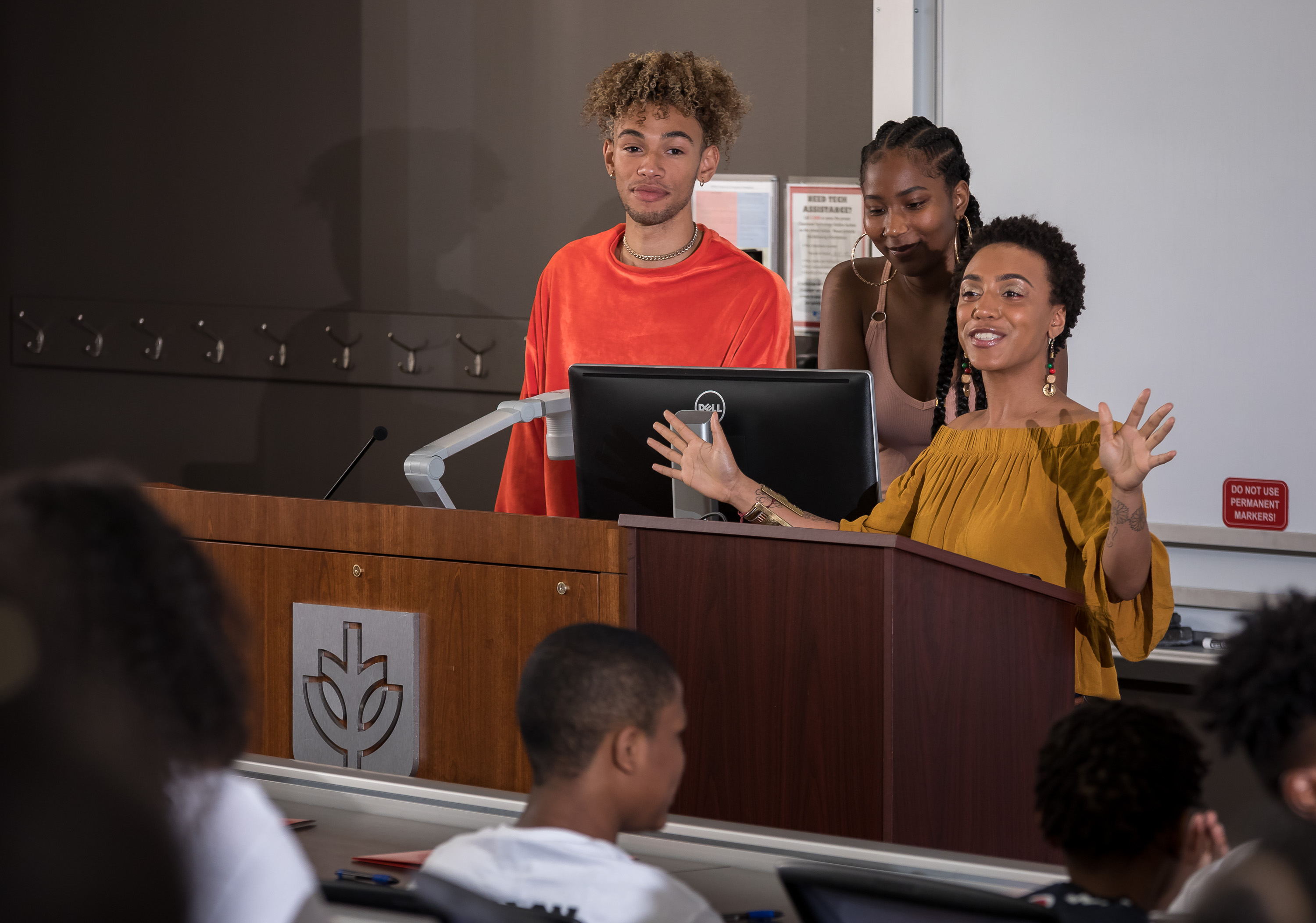 Amor Kohli, chair of the Department of African and Black Diaspora Studies, addresses students visiting the department at the end of May. In spring 2018, DePaul elevated the African and Black Diaspora program to a department. (DePaul University/Jeff Carrion)
Amor Kohli, chair of the Department of African and Black Diaspora Studies, addresses students visiting the department at the end of May. In spring 2018, DePaul elevated the African and Black Diaspora program to a department. (DePaul University/Jeff Carrion)
Since 2002, the African and Black Diaspora Studies program at DePaul has aimed to provide students with an interdisciplinary course of study of Africa and the Black world. After 16 years administering a rigorous and socially conscious inquiry into the histories, cultures and people of Africa and the Black diaspora, in spring 2018 the university elevated the program to a department.
"This is a historic accomplishment not only for all those involved in our program, but also for the College of Liberal Arts and Social Sciences and DePaul overall," says Amor Kohli, chair of the Department of African and Black Diaspora Studies. "We believe it is crucial that students of all backgrounds understand the contributions of Black people to worldwide histories and cultures; earning a department status further solidifies the importance of our work."
 In spring, Guillermo Vásquez de Velasco, dean for the College of Liberal Arts and Social Sciences, and members of the African and Black Diaspora Studies celebrated the program becoming a department. (Image courtesy of Amor Kohli)
In spring, Guillermo Vásquez de Velasco, dean for the College of Liberal Arts and Social Sciences, and members of the African and Black Diaspora Studies celebrated the program becoming a department. (Image courtesy of Amor Kohli)
Typically, university programs are a collection of courses that lead to a specific degree, whereas departments are recognized as groups of faculty organized into a unit for management and course planning. Though now officially a department at DePaul, African and Black Diaspora Studies will remain interdisciplinary, utilizing resources from across the university.
"With this important decision, LAS continues to cultivate an impressive constellation of multidisciplinary departments that effectively respond to the needs of our current and future students," says Guillermo Vásquez de Velasco, dean for the College of Liberal Arts and Social Sciences.
Faculty and students in African and Black Diaspora Studies cross-collaborate with other majors, minors and programs across the humanities and social sciences, with an emphasis on literary, cultural and media studies; the intersections of race, gender and sexuality; and historical inquiry.
Graduates of African and Black Diaspora Studies have gone on to pursue employment and graduate work in a variety of areas including media and cultural analysis, international relations, social work, higher education administration, law and social justice.
"We are thrilled to have become a department," Kohli says. "We look forward to continuing to develop intersectional curricula, collaborating with programs across campus and providing the university community with the opportunity to study these critical topics."
 DePaul students, left to right, Evan Lowry, Kayla Johnson and Nyah Hoskins speak to students from Betty Shabazz Charter School, on May 31. The charter school students visited DePaul to learn about the university and about African and Black Diaspora Studies as a field of inquiry. In spring 2018, DePaul elevated the African and Black Diaspora Studies program to a department. With its new departmental status, members of African and Black Diaspora Studies hope to continue community programming like this in the coming years. (DePaul University/Jeff Carrion)
DePaul students, left to right, Evan Lowry, Kayla Johnson and Nyah Hoskins speak to students from Betty Shabazz Charter School, on May 31. The charter school students visited DePaul to learn about the university and about African and Black Diaspora Studies as a field of inquiry. In spring 2018, DePaul elevated the African and Black Diaspora Studies program to a department. With its new departmental status, members of African and Black Diaspora Studies hope to continue community programming like this in the coming years. (DePaul University/Jeff Carrion)